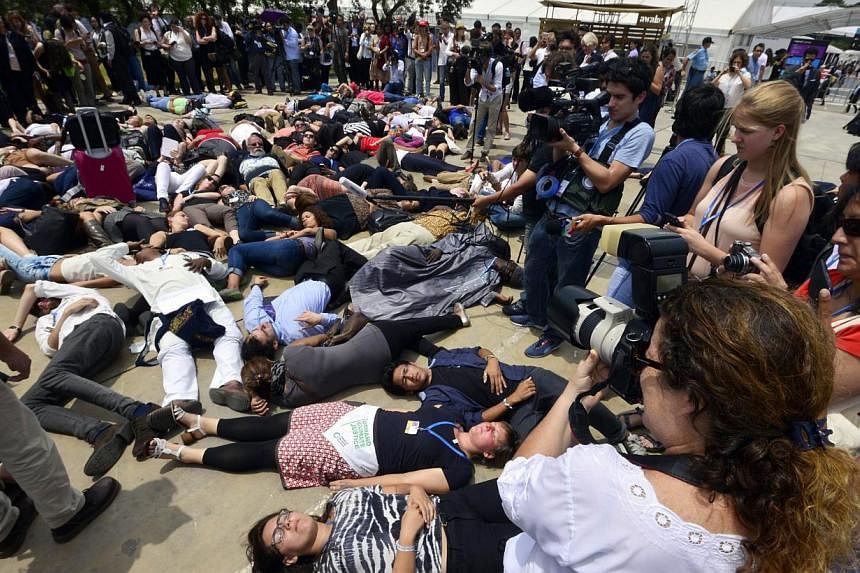LIMA (AFP) - Negotiators scrambled on the final day of UN talks Friday to break a deadlock between rich and developing countries on forging the elements of a world pact to curb climate change.
A years-old dispute over sharing responsibility for tackling the climate problem threatened to drive the 12-day haggle into extra time and darken prospects for the most ambitious environmental accord ever.
After countries butted heads over key components of the deal, conference host Peru ordered negotiators to craft a draft text with options for four sticking points.
Campaigners in Lima said they feared a weak-willed compromise.
"The latest text which countries are working on has been stripped down to its bare bones to accommodate the whims of the lowest common denominator," said Christian Aid's Mohamed Adow.
"Right now we are facing the prospect of being no further forward than we were when we left last year's meeting in Warsaw."
Green group WWF, also observing the annual negotiations round, said the new draft "contains a mixed bag of options."
"It's crunch time for negotiators here in Lima and everything is still up in the air," WWF said.
Countries disagree on how "differentiation" will be applied in a process next year of declaring national pledges for curbing Earth-warming greenhouse gas emissions.
Developing nations insist the West must bear a bigger burden for the carbon cuts, having started decades earlier to pollute their way to prosperity.
But rich countries point the finger at developing giants like China and India furiously burning coal to power their rapid growth.
Developing nations further demand that pledges incorporate not only action on reducing carbon emissions, but also financial help and adaptation aid to shore up their climate defences.
On Thursday, US Secretary of State John Kerry urged developing nations to realise they too have to roll back pollution from fossil fuels, even if they felt it was unfair.
"We have to remember that today more than half of global emissions - more than half - are coming from developing nations. So it is imperative that they act, too," he said during a quick stop at the negotiating venue.
A format for the pledges must be agreed in the Peruvian capital to allow countries to start their submissions from the first quarter of next year.
They will be at the core of a global climate pact that nations have agreed to sign in Paris in December 2015, to enter into effect by 2020, seeking to limit average global warming to 2 deg C over pre-Industrial Revolution levels.
'WEAK TO BARELY ACCEPTABLE'
"Some key elements fell to the cutting room floor and are not in the text at all," Union of Concerned Scientists analyst Alden Meyer said of the latest draft.
Dropped text included language on absolute, economy-wide mitigation targets for developed countries.
The current range of options on key points "go from weak or minimal, to barely acceptable, to OK," said Meyer.
And he predicted differentiation would remain a tough issue Friday, having been "pretty much scrubbed out of most of the text."
"That may not be acceptable to some" developing countries.
Another major blocking point is whether or not to have a process to assess the pledges' global impact on the 2 deg C goal - with China a key opponent.
Frustrated by the lack of progress by late Thursday, Peruvian Environment Minister Manuel Pulgar-Vidal, who presides over the talks, called for constructive exchanges.
"We are in a time in which we should take decisions," he said. "We don't want to leave Lima with empty hands."
And UN Secretary-General Ban Ki-moon urged ministers and officials Thursday to embark on "real, serious negotiations."
"We have been talking over the last two decades," said Ban. "We don't have a moment to lose."
Scientists say 2 deg C of warming is relatively safe but still no guarantee against damage to the climate system.
On current carbon trends, the planet is on course for around 4 deg C of warming this century, dooming future generations to a planet of worsening drought, flood, storm and rising seas, they say.

